Troubled Families

Rabbi Shmuley Boteach, the host of TLC's reality TV series Shalom in the Home, gives on-the-spot parenting advice to families in crisis. A father of eight and author of 10 Conversations You Need to Have with Your Children, Rabbi Shmuley says he aims to bring shalom—or peace—to troubled families who are collapsing in dysfunction.
Rabbi Shmuley says the greatest threat facing America today is internal. "The catastrophic decline of the American family, the utter disintegration, the decentralization of the American home is our foremost national emergency," Rabbi Shmuley says.
The root of the problem, says Rabbi Shmuley, is that families today are disconnected—and he says "checked out" parents are largely to blame.
Rabbi Shmuley says the greatest threat facing America today is internal. "The catastrophic decline of the American family, the utter disintegration, the decentralization of the American home is our foremost national emergency," Rabbi Shmuley says.
The root of the problem, says Rabbi Shmuley, is that families today are disconnected—and he says "checked out" parents are largely to blame.

The Hurons have been married for 16 years and have four children. Greg is a chiropractor; Ruth is a yoga instructor. They bring calm to their clients' lives—but as Rabbi Shmuley discovers during his stay with the family, there is no peace in their own home.
Ruth finds herself in a constant battle with her kids, who she says "don't really care." "They're beating us down to nothing," Ruth says.
Greg says the kids lack respect for each other and their mother. Instead, he says his kids "have become very manipulative and sneaky."
Ruth finds herself in a constant battle with her kids, who she says "don't really care." "They're beating us down to nothing," Ruth says.
Greg says the kids lack respect for each other and their mother. Instead, he says his kids "have become very manipulative and sneaky."
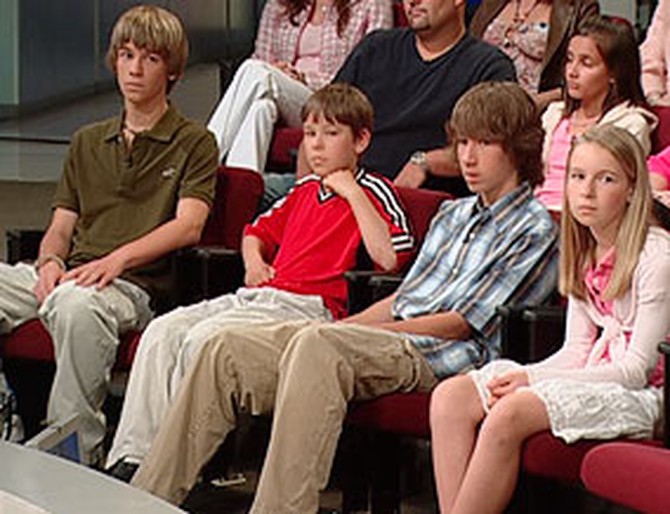
The Huron children say their mom's constant nagging fills them with anger and frustration. "My mom nags way too much," says Nick. "She picks the littlest things and argues about them and complains."
As for dad Greg, the kids say he's either ticked off or tuned out. "Normally, dad's at work, and we understand he has to be there, but even when he's home, he just says, 'Oh, I don't want to deal with that right now,'" says Forrest. "Then when he does, he just gets really angry and gets in a bad mood. He affects the whole house, basically, because it's a trickle-down effect."
Rabbi Shmuley says that children misbehave because of ineffective parenting. After assessing the Huron's situation, he offers Ruth and Greg some simple ways to change the way they parent.
As for dad Greg, the kids say he's either ticked off or tuned out. "Normally, dad's at work, and we understand he has to be there, but even when he's home, he just says, 'Oh, I don't want to deal with that right now,'" says Forrest. "Then when he does, he just gets really angry and gets in a bad mood. He affects the whole house, basically, because it's a trickle-down effect."
Rabbi Shmuley says that children misbehave because of ineffective parenting. After assessing the Huron's situation, he offers Ruth and Greg some simple ways to change the way they parent.

Rabbi Shmuley says the Hurons are making a common mistake by parenting out of fear and trying to be their children's friend. "We believe that by coming off the pedestal and not asserting authority, they will embrace us much more warmly—it is simply not true," he says. "They will have many friends in life—they will have one father, they will have one mother."
Rabbi Shmuley says Greg is allowing his success outside the home to determine his success inside the home—when he feels he falls short, the whole family suffers. "It comes down to money and fame," Rabbi Shmuley says. "So the average guy who just does the right thing but is unknown for it feels like he's a zero."
In order to be a successful family unit, Rabbi Shmuley says Ruth and Greg need to redefine success in their lives. "The man who sits and does homework with his children when nobody is watching...The man who conquers his passions and focuses his lust on one woman—his wife—when no one's watching...To do right because it's right—that is heroic," Rabbi Shmuley says.
Rabbi Shmuley says Greg is allowing his success outside the home to determine his success inside the home—when he feels he falls short, the whole family suffers. "It comes down to money and fame," Rabbi Shmuley says. "So the average guy who just does the right thing but is unknown for it feels like he's a zero."
In order to be a successful family unit, Rabbi Shmuley says Ruth and Greg need to redefine success in their lives. "The man who sits and does homework with his children when nobody is watching...The man who conquers his passions and focuses his lust on one woman—his wife—when no one's watching...To do right because it's right—that is heroic," Rabbi Shmuley says.
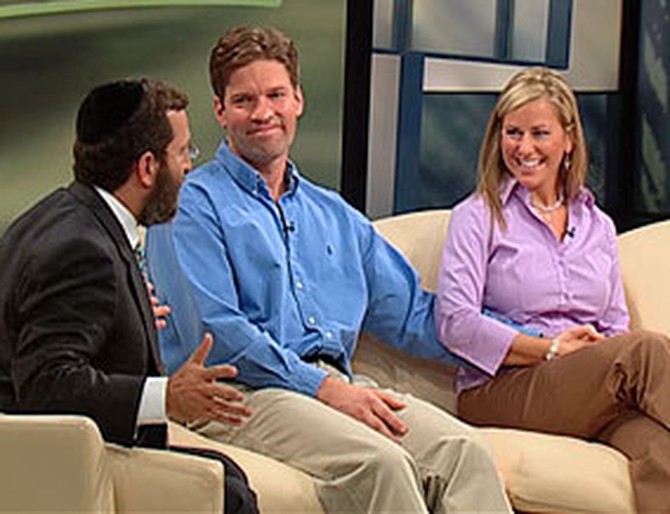
After putting Rabbi Shmuley's advice into action, Ruth and Greg says the family is closer than ever. Greg says Rabbi Shmuley helped him see just how much his family means to him. "I just realized that I have the greatest riches in my house," Greg says. "It was a change in my mindset. Those four children and Ruth are the best gift and treasure and the biggest success I will ever have in my life, and I put them first."
Ruth says she no longer nags her children and sees her role in a new light. "You're there to inspire, to uplift, to care for, to know that you're safe," Ruth says. "And just that awareness helped me—seeing how disassociated we were."
Rabbi Shmuley helped the Hurons implement their own "family day" for reconnecting. The family sets aside one night a week—without any interruptions from TV, phones or friends—to spend time talking, playing board games and just hanging out.
Ruth says she no longer nags her children and sees her role in a new light. "You're there to inspire, to uplift, to care for, to know that you're safe," Ruth says. "And just that awareness helped me—seeing how disassociated we were."
Rabbi Shmuley helped the Hurons implement their own "family day" for reconnecting. The family sets aside one night a week—without any interruptions from TV, phones or friends—to spend time talking, playing board games and just hanging out.
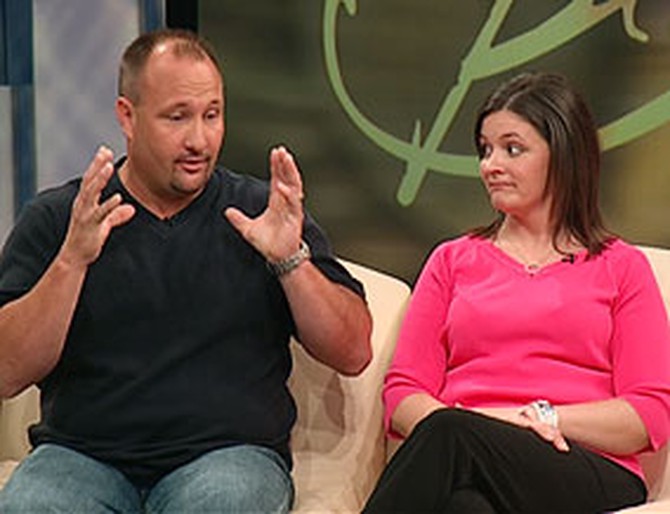
Well-intentioned parents who want to give their children everything can relate to the Legaard family. Brandie and Danny say they just can't say no to their two out-of-control children, Baylie and Corey.
"The kids are absolutely spoiled," Brandie says. "It's never enough." What happens when the kids do get "no" for an answer? "We nicknamed Baylie 'Hagatha,'" says Brandie, "because any time she doesn't get her way, she turns into, basically, a little witch."
As "the temper tantrum drama queen," Baylie begs constantly and throws fits. At a friend's birthday party, Baylie tells her mom she needs more money. When Brandie says no, Baylie says she will take the money out of Brandie's purse.
Brandie and Danny's son also knows how to get his way. "It will be a thousand times asking for the same thing with Corey," says Danny, "until you finally just say, 'Fine!'"
"I feel like if we don't set limits with the kids and get our spending under control, not only will we be completely financially depleted," Danny says, "but we also are not showing the kids how to use money, how to save money—so we're not properly raising them."
"The kids are absolutely spoiled," Brandie says. "It's never enough." What happens when the kids do get "no" for an answer? "We nicknamed Baylie 'Hagatha,'" says Brandie, "because any time she doesn't get her way, she turns into, basically, a little witch."
As "the temper tantrum drama queen," Baylie begs constantly and throws fits. At a friend's birthday party, Baylie tells her mom she needs more money. When Brandie says no, Baylie says she will take the money out of Brandie's purse.
Brandie and Danny's son also knows how to get his way. "It will be a thousand times asking for the same thing with Corey," says Danny, "until you finally just say, 'Fine!'"
"I feel like if we don't set limits with the kids and get our spending under control, not only will we be completely financially depleted," Danny says, "but we also are not showing the kids how to use money, how to save money—so we're not properly raising them."
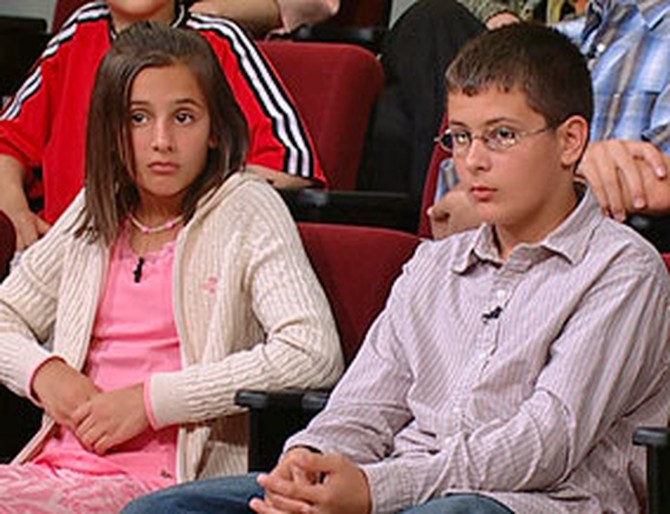
Baylie and Corey know exactly how to manipulate their parents. "I think I have a good strategy to get what I want," Corey says, showing off his two guitars, drum set, PlayStation, Xbox and three skateboards. "I'm on my seventh cell phone. My newest phone has a picture caller I.D. on the front," he says.
Baylie is on her "third or fourth" cell phone but her proudest possession is her designer handbag. "My favorite thing that my parents bought me recently is my Dooney & Bourke purse," she says. "I want a Coach purse."
Where does Baylie get her appetite for high-end accessories? "I don't carry a Coach purse," Brandie says. She believes her daughter is trying to keep up with her peers.
Does Baylie realize she's overindulged? "I might be a little spoiled...I'm a lot spoiled," she says.
Baylie is on her "third or fourth" cell phone but her proudest possession is her designer handbag. "My favorite thing that my parents bought me recently is my Dooney & Bourke purse," she says. "I want a Coach purse."
Where does Baylie get her appetite for high-end accessories? "I don't carry a Coach purse," Brandie says. She believes her daughter is trying to keep up with her peers.
Does Baylie realize she's overindulged? "I might be a little spoiled...I'm a lot spoiled," she says.
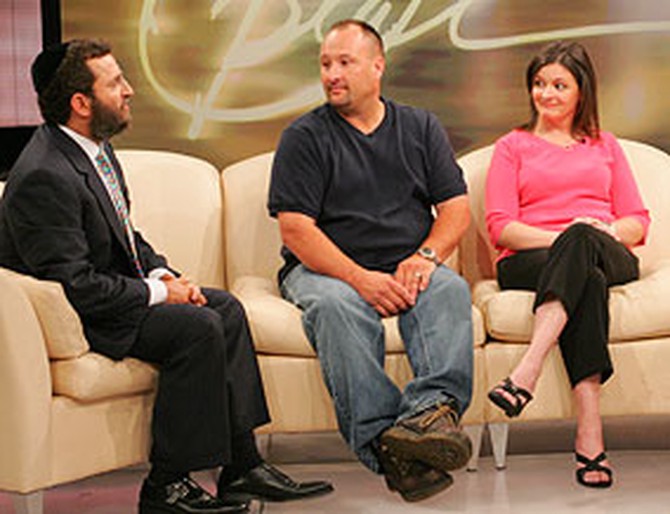
Rabbi Shmuley says overindulgence is causing American children to "rot." "Our teeth rot when we leave the plaque and we don't brush them," he says. "When we don't discipline our children and remove that decay of selfishness, they spoil."
Rabbi Shmuley says parents like Brandie and Danny are setting their children up for a lifetime of longing. "You're teaching your children insatiability. They'll never know happiness. Good enough is never good enough."
Rabbi Shmuley gives Brandie and Danny four major changes they need to make in the way they parent.
Rabbi Schmuley says parents must heal themselves in order to raise healthy children. "We weren't given enough love as children," he says. "Our parents were going to give us the things they never had. So instead of the gift of themselves, they gave us things. ... What you're saying [is], 'I know I don't deserve your love so I'm going to buy you; I'm going to purchase you.' Don't bequeath your insecurities to your children."
Rabbi Shmuley says parents like Brandie and Danny are setting their children up for a lifetime of longing. "You're teaching your children insatiability. They'll never know happiness. Good enough is never good enough."
Rabbi Shmuley gives Brandie and Danny four major changes they need to make in the way they parent.
- Put a moratorium on shopping for three months.
- Establish boundaries with immediate consequences. "Never give a punishment that you're weak on later," Shmuley says.
- Inspire your children. "Sit down with your kids. Don't ask them just what they want to do in life. Ask them who they want to be—'Do you want to be good people or bad people?'" Rabbi Shmuley says. "You'd be amazed at how we can really touch our children with [our] voice of conscience."
- Identify your passions and share them with your children. "Our principal identity can't just come from being parents," Rabbi Shmuley says.
Rabbi Schmuley says parents must heal themselves in order to raise healthy children. "We weren't given enough love as children," he says. "Our parents were going to give us the things they never had. So instead of the gift of themselves, they gave us things. ... What you're saying [is], 'I know I don't deserve your love so I'm going to buy you; I'm going to purchase you.' Don't bequeath your insecurities to your children."
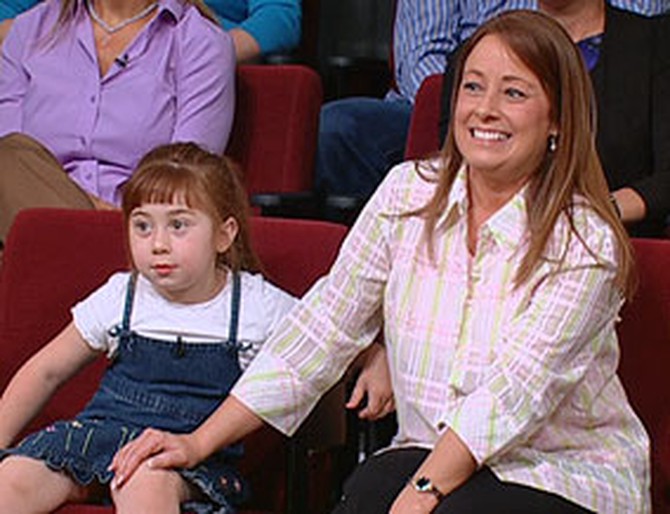
Kelly is a divorced single mom who says she spoils her 4-year-old daughter, Gianna, with tons of toys, DVDs, clothes, manicures and pedicures—and even diamond earrings.
Kelly says she has spent over $5,000 on Gianna's 50 Barbie dolls and accessories, more than $1,000 on American Girl dolls and accessories, and more than $2,000 on DVDs. When it comes to clothes, Kelly says there is no budget. Gianna even has her own designer purse and a cell phone.
"While I admit I spoil her, I don't see anything wrong with it," Kelly says.
Kelly says she has spent over $5,000 on Gianna's 50 Barbie dolls and accessories, more than $1,000 on American Girl dolls and accessories, and more than $2,000 on DVDs. When it comes to clothes, Kelly says there is no budget. Gianna even has her own designer purse and a cell phone.
"While I admit I spoil her, I don't see anything wrong with it," Kelly says.
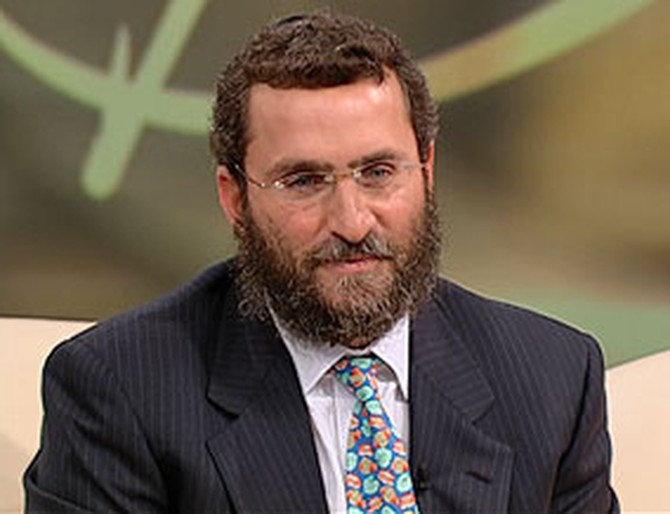
Rabbi Shmuley says Kelly is doing a disservice to her daughter by spoiling her with material possessions. "You're giving your daughter not a sense of being but a sense of having," Rabbi Shmuley says. "If she doesn't have, she's not happy. You're going to open a cavernous space that needs to be filled always with things instead of love."
Kelly says she doesn't get to spend as much time with her daughter as she would like to and tries to make up for working full time by buying her things. "It makes me feel less guilty of leaving her every day," she says.
Rabbi Shmuley says Kelly needs to stop parenting out of guilt. "You're a beautiful mom and you love your daughter," he tells her. "Give her the gift of yourself."
Kelly says she doesn't get to spend as much time with her daughter as she would like to and tries to make up for working full time by buying her things. "It makes me feel less guilty of leaving her every day," she says.
Rabbi Shmuley says Kelly needs to stop parenting out of guilt. "You're a beautiful mom and you love your daughter," he tells her. "Give her the gift of yourself."
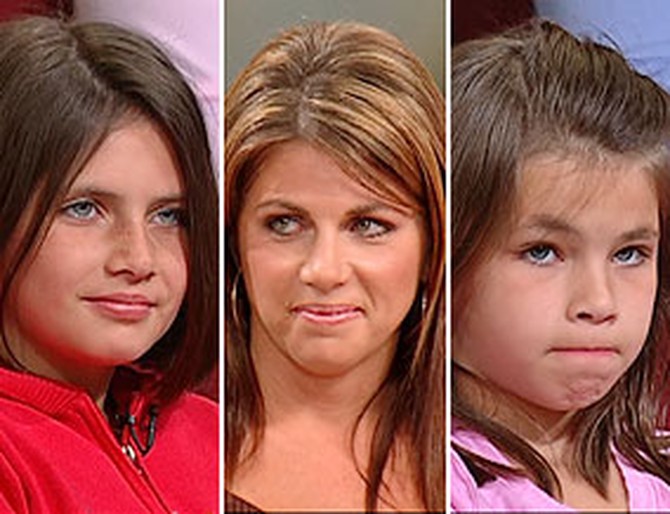
In Orlando, Florida, the Moor family is in desperate need of Rabbi Shmuley's help as they struggle through the anniversary of a tragic death. Carolyn Moor's husband, Chad, was killed in a car accident six years ago on Valentine's Day.
"Because he died so suddenly, I do still love him," Carolyn says. "I love a person who isn't alive. It's as simple as that."
Trapped in her sorrow, Carolyn is obsessed with watching videos of her late husband with her daughters, Mackensey and Meagan. She also can't let go of the blood-stained sweater she wore the night Chad died. "If my mom stops crying about my dad, I would stop crying," says Mackensey.
"Because he died so suddenly, I do still love him," Carolyn says. "I love a person who isn't alive. It's as simple as that."
Trapped in her sorrow, Carolyn is obsessed with watching videos of her late husband with her daughters, Mackensey and Meagan. She also can't let go of the blood-stained sweater she wore the night Chad died. "If my mom stops crying about my dad, I would stop crying," says Mackensey.

Rabbi Shmuley says Carolyn is an amazing woman but she has insisted on seeing herself as tragic. "She's a true hero in every sense of the word, but she didn't know it," he says. "We can't control when death visits us, when tragedy visits us—but we can control whether or not we invite it in to remain as a permanent fixture in our homes."
He says that Carolyn, in order to overcome her grief, must learn that happiness is a choice. "We're all waiting for something to happen outside to bring us happiness. If I win the lottery, you know, I'll be happy, or that big promotion I'm waiting for. ... We all think that in life there's action and reaction. There isn't—there's action, choice, reaction."
He says that Carolyn, in order to overcome her grief, must learn that happiness is a choice. "We're all waiting for something to happen outside to bring us happiness. If I win the lottery, you know, I'll be happy, or that big promotion I'm waiting for. ... We all think that in life there's action and reaction. There isn't—there's action, choice, reaction."
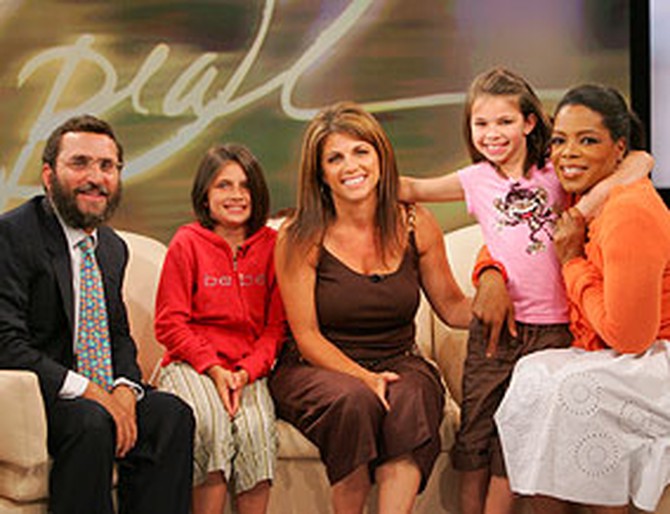
Rabbi Shmuley takes the Moors to SeaWorld on a special mission to get past the day that crushes Carolyn every single year—the anniversary of Chad's death near Valentine's Day. "It may seem superficial to force them to have fun today," he says, "but there's a method to my madness."
Rabbi Shmuley starts by laying down the rules—he wants Carolyn to do something she hasn't done in six years. "No mentioning Dad today," he says. "Dad is an integral part of life, but he's in the heart. He doesn't have to be talked about all the time. ... We're going to just have a really good time—a fun, joyous day with a family that celebrates life."
The family straps on their earpieces so Rabbi Shmuley can give them play-by-play instructions and encourage Carolyn to have fun with her daughters. At the end of the day, the girls tell Rabbi Shmuley they've enjoyed seeing their mom happy.
This Valentine's Day trip was a breakthrough for Carolyn and she's since started choosing happiness. "We're not tragic," she says. "I'm not only a single mom but I'm also a widow and I'm doing all of this all by myself. ... I'm consciously making the choices to be present every day with my daughters and be an inspiration to them."
Rabbi Shmuley starts by laying down the rules—he wants Carolyn to do something she hasn't done in six years. "No mentioning Dad today," he says. "Dad is an integral part of life, but he's in the heart. He doesn't have to be talked about all the time. ... We're going to just have a really good time—a fun, joyous day with a family that celebrates life."
The family straps on their earpieces so Rabbi Shmuley can give them play-by-play instructions and encourage Carolyn to have fun with her daughters. At the end of the day, the girls tell Rabbi Shmuley they've enjoyed seeing their mom happy.
This Valentine's Day trip was a breakthrough for Carolyn and she's since started choosing happiness. "We're not tragic," she says. "I'm not only a single mom but I'm also a widow and I'm doing all of this all by myself. ... I'm consciously making the choices to be present every day with my daughters and be an inspiration to them."
Published 06/26/2006

